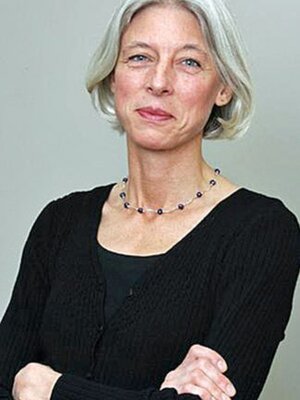The Krouse Family Visiting Scholars in Judaism and Western Culture Fund made another exciting visit possible this year. Dagmar Herzog a Distinguished Professor at the CUNY Graduate Center, and her meticulous research on sexuality and fascism has been highly influential. Her most recent books include Sexuality in Europe: A Twentieth-Century History (2011); Sex in Crisis: The New Sexual Revolution and the Future of American Politics (2008); Intimacy and Exclusion: Religious Politics in Pre-Revolutionary Baden (2007); Sex After Fascism: Memory and Morality in Twentieth-Century Germany (2005). As Brett noted in introducing Dagmar, “Sex after Fascismtraces the active forgetting of how Nazism fostered a contradictory set of sexual desires while simultaneously projecting an image of sanctity. While it was this purified vision of sexual relations that persisted, Herzog’s detailed analysis of documents and state propaganda indicates that this was far from the case.” One of Herzog’s central questions explains how the “connections between Nazi sexual enticements and Nazi racism came to be so energetically forgotten, only to be replaced by the new… ‘memory’ of Nazism as sexually constrictive and uptight” (5-6). Herzog studies this forgetting and analyzes how German fascism truly functioned. By studying this contradiction in its various forms, she has inaugurated a topic that focuses on "sex as a major preoccupation" in the Nazi regime. Herzog’s work crystallizes the significance of the targets of Nazi violence (Jewish people and the disabled); the places of the most extreme violence; and the ideology of Nazi desire to bring a new form of "pleasure" to Aryan peoples.
Herzog's workshop, "Sexual Violence and the Nazi Holocaust," was a privilege to attend for the 20 professors and graduate students from departments of Comparative Literature, French, History, English, Spanish, and Religion. Herzog detailed the state of the field of Nazi fascism and the sexualization of the Nazi regime. Her examples included the film The Pawnbroker, on the trauma of one male survivor; a pulp book, Eichman: Man of Slaughter (1960), and then moved on to discuss important scholarship devoted to sexuality and Nazi violence. Focusing on the overall plan to exterminate the Jews, Herzog debated the idea of rape as a unique essence of grotesque sexual violence.
Herzog's public lecture on "survivors' syndrome" detailed the history of reparation cases after World War II, with Herzog documenting the arguments of the "supporters" and "deniers" of cases of psychological and psychic damage of thousands of survivors. This was a packed audience, riveted by her historical analysis of how doctors and psychiatrists dealt with Nazi victims and the aftermath of the war. Only after the US's loss in Vietnam and the recognition of PTSD were the survivors’ suffering acknowledged and some reparations made for their material and psychological loss.
On Tuesday evening the 9th, Herzog joined Brett’s Comparative Literature Professionalization seminar, where students engage issues about teaching, publication, and professional work. She advised them to seek a dissertation committee member outside of our university, discussed the state of the job market, and examined some of the shifts in the humanities. Students were enthralled with this discussion, especially the opportunity to ask such a renowned scholar questions about future studies of the Holocaust. For the Holocaust, Genocide, and Memory Studies Program, Herzog participated in a lively discussion, among scholars from French, German, Comparative Literature, and English, of two essays on “forgetting” in colonial history.
Once again, the Krouse Family has made possible this opportunity to advance our collective studies in Holocaust history and sexual politics.
